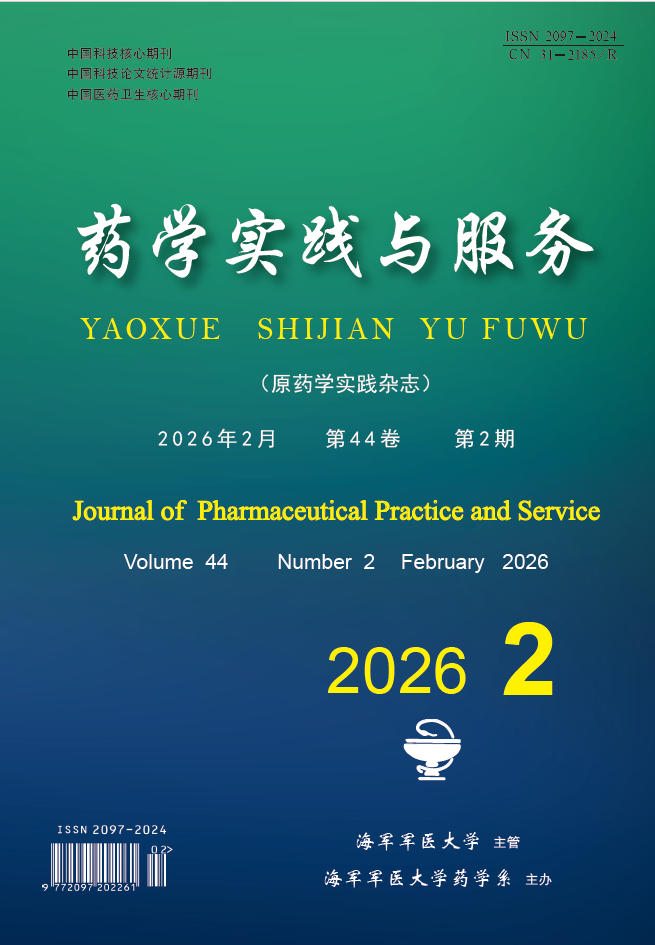2024 Vol. 42, No. 8
Display Method:
2024, 42(8): 319-324.
doi: 10.12206/j.issn.2097-2024.202308062
Abstract:
Chiral drugs are closely related to the safety and effectiveness of drug use. Most dihydropyridine drugs have chiral carbon atoms, which are used as racemes and produce stereoselective disposal characteristics after entering the body, and may affect the safety and effectiveness of drugs. Therefore, based on the chiral resolution and pharmacokinetic characteristics of this class of drugs, the selection rules of chiral HPLC and CE methods and in vivo analysis applications of this class of drugs in recent years were reviewed. The stereoselective pharmacokinetics of this class of drugs were listed and compared. It was found that some of these drugs had obvious differences in stereoselective pharmacokinetics, and the pharmacokinetics and toxicity in vivo were also different.
Chiral drugs are closely related to the safety and effectiveness of drug use. Most dihydropyridine drugs have chiral carbon atoms, which are used as racemes and produce stereoselective disposal characteristics after entering the body, and may affect the safety and effectiveness of drugs. Therefore, based on the chiral resolution and pharmacokinetic characteristics of this class of drugs, the selection rules of chiral HPLC and CE methods and in vivo analysis applications of this class of drugs in recent years were reviewed. The stereoselective pharmacokinetics of this class of drugs were listed and compared. It was found that some of these drugs had obvious differences in stereoselective pharmacokinetics, and the pharmacokinetics and toxicity in vivo were also different.
2024, 42(8): 325-333.
doi: 10.12206/j.issn.2097-2024.202401033
Abstract:
Objective To study the mechanism of antidepressant effect of Baihe Zhimu decoction based on NLRP1 inflammasome. Methods A chronic unpredictable mild stress(CUMS)induced depression mouse model was constructed. C57BL/6J mice were randomly divided into a control group, CUMS group, low-dose Baihe Zhimu decoction group, high-dose Baihe Zhimu decoction group, and MDP group(NLRP1 activator). After continuous administration for 4 weeks, the behavioral characteristic of mice was investigated. The levels of mice hippocampal inflammatory factors IL-1β、IL-6,TNF-α, and neurotransmitters 5-HT, NE, and DA were detected by ELISA. The expression of inflammasome related proteins NLRP1, ASC, and caspase-1, as well as related proteins in BDNF/TrkB and ERK/AKT/mTOR signaling pathway were detected by Western blot. Immunofluorescence was used to detect changes in BDNF expression in the hippocampus of mice. Results Baihe Zhimu decoction inhibited the activation of NLRP1 inflammasomes in the hippocampus of CUMS mice, improved their behavioral characteristics, increased the level of neurotransmitters in the hippocampus, and reduced the inflammatory response. The NLRP1 activator MDP reversed the above effects of Baihe Zhimu decoction. Baihe Zhimu decoction increased BDNF, TrkB expression, and phosphorylation levels of ERK, AKT, and mTOR proteins, which could be reversed by MDP. Conclusion Baihe Zhimu decoction improved depression like behavior in CUMS mice by inhibiting NLRP1 inflammasome activation and hippocampal neuroinflammatory response, and thereby activating BDNF/TrkB and ERK/AKT/mTOR signaling pathway.
2024, 42(8): 334-340.
doi: 10.12206/j.issn.2097-2024.202303023
Abstract:
Objective To make the cost-effectiveness analysis of pembrolizumab and platinum chemotherapy as the first-line treatment for advanced non-small cell lung cancer (NSCLC) in the population with tumor proportion score (TPS) ≥ 1% of PD-L1, and provide some reference for the clinical use and future price negotiation of pembrolizumab. Methods Based on Pubmed database, the published RCT literatures of pembrolizumab were analyzed, and the survival data were extracted, combined with the treatment plan of a tertiary hospital, the Markov model were established to simulate the cost and health effectiveness of patients for twenty years, and the stability of the model was tested by one-way sensitivity analysis and probability sensitivity analysis. Results Twenty years later, the cost-effectiveness ratio of pembrolizumab group and chemotherapy group was ¥58 517.60/quality adjusted life month (QALM) and ¥41 213.08/QALM. Compared with the chemotherapy group, the incremental cost effective ratio (ICER) was ¥104 485.36/QALM. Conclusion When the willingness to pay (WTP) value was ¥30 902/QALM, the pembrolizumab therapy was not more cost-effective advantages than platinum chemotherapy, and the sensitivity analysis showed that the results of the model were relatively stable.
2024, 42(8): 341-345.
doi: 10.12206/j.issn.2097-2024.202404082
Abstract:
Objective To establish an UPLC-MS/MS method for determinating content of three paclitaxel fatty acid esters such as paclitaxel myristate (PTX-MA), paclitaxel palmitate (PTX-PA) and paclitaxel myristate (PTX-SA) in mouse plasma, and preliminarily investigate the pharmacokinetic characteristics of their liposomes in mice. Methods Eclipse Plus C8 chromatography column (2.1 mm×50 mm, 1.8 μm) was used with different proportions of 0.2% formic acid aqueous solution (A) and methanol (B) mixture as mobile phase for gradient elution at a flow rate of 0.3 ml/min. The collum temperature was 30℃. The sample injection volume was 10 μl. The triple quadrupole mass series spectrometer was used as multi-reaction monitoring (MRM). Results PTX-MA, PTX-PA and PTX-SA all exhibited a good linear relationship in the range of 5.0~500.0 ng/ml (r>0.9950 ). Their RSD of precision, stability, extraction recovery rate and matrix effect test results was all less than 10%. The half-lives (t1/2) for liposomes of three paclitaxel fatty acid esters PTX-MA-L、PTX-PA-L and PTX-SA-L in mice were 14.78 h, 44.49 h and 69.32 h individually, and their clearance rates (CL) were 29.06 L·kg/h, 24.94 L·kg/h and 13.74 L·kg/h, respectively. Conclusion This method had high specificity, sensitivity, easy operation and good stability, which could be used for the determination of paclitaxel fatty acid esters in mouse plasma. The results of pharmacokinetic studies in mice showed that t1/2 for paclitaxel fatty acid esters were significantly prolonged, and the clearance rate were significantly reduced with the length of fatty acid carbon chains increasement, which indicated that esterification of paclitaxel with different chain length saturated fatty acids could obviously alter its in vivo pharmacokinetic properties, which provided scientific basis for the research and development of nano formulations of paclitaxel fatty acid ester prodrug.
2024, 42(8): 346-349.
doi: 10.12206/j.issn.2097-2024.202211047
Abstract:
Objective To study the sedative and hypnotic effects of Yening Capsules and investigate its bioactive mechanism in mice. Methods The mice were randomly divided into control group, estazolam group (0.8 mg/kg), low, medium and high-dose Yening Capsules groups (400, 600 and 800 mg/kg). The locomotor activity, latency to persistent sleep, sleep duration and sleep rate were determined respectively in mice via the open field test and injection of pentobarbital sodium in subthreshold and suprathreshold doses. The content of GABA, 5-HT, DA and NE in brain tissue of mice were detected by enzyme-linked immunosorbent assay(ELISA). Results Compared with the control group, Yening Capsules medium and high dose group (P<0.05, P<0.01)significantly decreased the locomotor activity of mice.The sleep latency in Yening Capsules medium and high dose group were significantly shorten (P<0.05, P<0.05)and the sleep duration (P<0.05, P<0.01)were extended. The sleep rate of Yening Capsules medium and high dose groups (P<0.05, P<0.01) was significantly increased. Compared with the control group, high dose of Yening Capsules can significantly increase GABA (P<0.05), 5-HT (P<0.05), DA (P<0.05), NE (P<0.01) in mouse brain tissue. Conclusion Yening Capsules had obvious sedative and hypnotic effects, and its mechanism may be related to the increasement of GABA, 5-HT, DA and NE level in brain tissue of mice.
2024, 42(8): 350-358.
doi: 10.12206/j.issn.2097-2024.202303048
Abstract:
Objective To predict the potential Q-markers of Abri Herba based on network pharmacology and molecular docking and establish a quality control characteristic. Methods The network relationship of “Abri Herba - component - target - pathway” was constructed by using a variety of databases and the method of network pharmacology. The potential Q-markers of Abri Herba were predicted and then the characteristic Chromatogram of Abri Herba was established by high performance liquid chromatography Results Through the network pharmacological prediction, it was found that the components of abrine hypaphorine, schaftoside in Abri Herba were closely associated with the main targets, such as AKT1, STAT3, HIF1A, GRB2, MMP9, which could act on HIF-1, PI3K-Akt, JAK-STAT and other signaling pathways and have good pharmacological activities to be potential Q-markers of Abri Herba. Then HPLC was used to establish the characteristic according to retention time. Conclusion Through network pharmacology and molecular dock-prediction combined with HPLC detection, the characteristic chromatogram was established with the components of abrine hypaphorine, schaftoside as Q-markers, which could control the quality of Abri Herba by combining the components and pharmacological activities.
2024, 42(8): 359-364.
doi: 10.12206/j.issn.2097-2024.202310015
Abstract:
Objective To explore the ideas and measures to further optimize China’s drug emergency approval system by comparing the drug emergency approval systems in China and other countries. Methods The current situation of China’s drug emergency approval system was analyzed and compared with the relevant systems of the United States, the European Union and Japan. Results The goal of drug emergency approval in other countries is clearly positioned to accelerate the review and listing of urgently needed clinical drugs for the purpose of clinical needs, forming a multi-channel, multi-mode and multi-mechanism priority review system covering the whole process, and the regulatory system is clear, complete, and operable. The corresponding approval system in China started late and is in the stage of continuous improvement, which needs to be improved in terms of system construction, government functions, personnel optimization, and post-market supervision. Conclusion Drug regulatory authorities in China should summarize their past work experience and draw on some feasible approval models and regulatory approaches in foreign countries, further improve the system and process of the drug emergency approval system and enhance the efficiency of drug approval and the ability to protect drugs in response to emergencies.



 Contribution System
Contribution System Author Login
Author Login Review Login
Review Login Editor Login
Editor Login Reader Login
Reader Login



 News
News